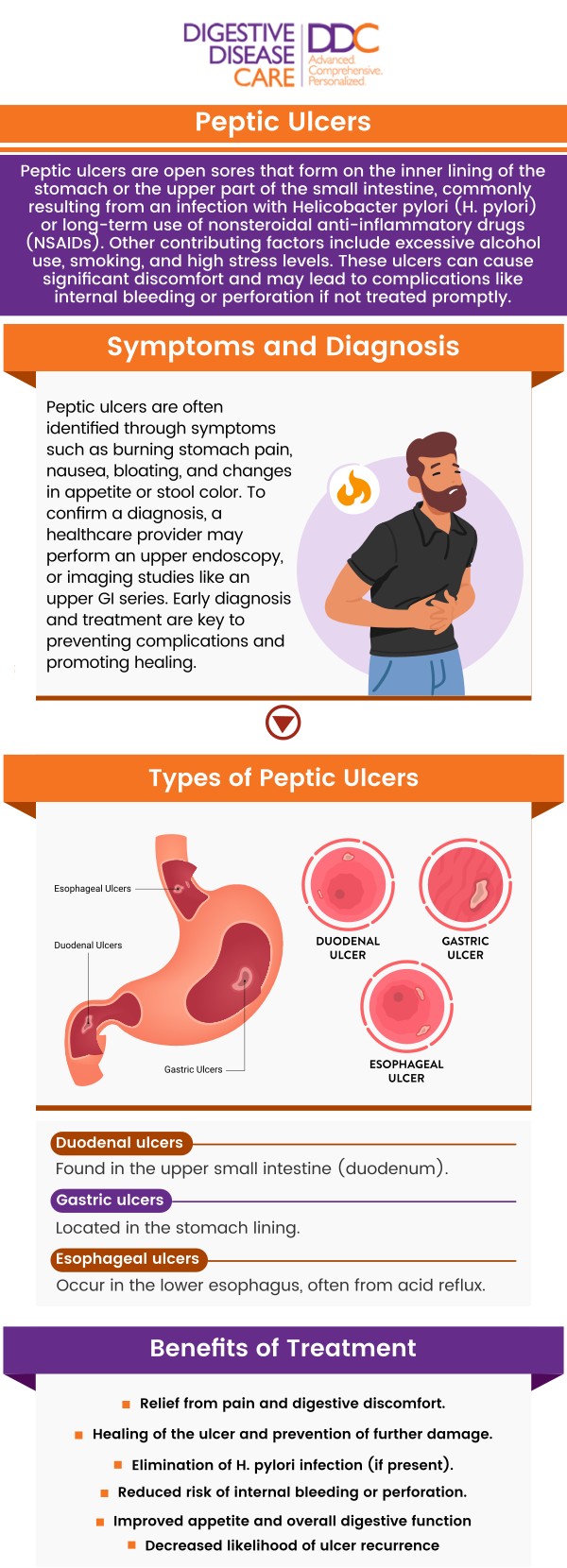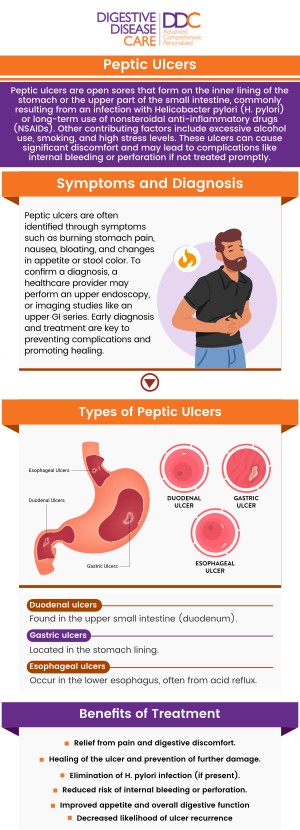Peptic Ulcers Treatment Q&A
At Digestive Disease Care (DDC), our board-certified gastroenterologists have abundant experience and expertise in treating peptic ulcers. Please contact us for more information or request an appointment online. We have convenient locations to serve you in Babylon NY, East Setauket NY, Forest Hills NY, Jericho NY, Lake Success NY, Melville NY, Mineola NY, Massapequa NY, New Hyde Park NY and Riverhead NY.




Table of Contents:
What causes peptic ulcers?
How do you treat a peptic ulcer?
What are the symptoms of a stomach ulcer?
Is a peptic ulcer curable?
In addition to messing with your appetite and diet, ulcers can cause significant pain and discomfort! With that in mind, it may not need to be said. Still, it is important to seek medical attention if you think you may be dealing with a peptic ulcer to avoid more serious complications, such as peritonitis or a perforated ulcer. If you are dealing with a peptic ulcer, our board-certified gastroenterologists at Digestive Disease Care would be happy to provide you with swift, thorough, and first-rate treatment to relieve you of your peptic ulcer.
Peptic ulcers occur when sores develop in your lower esophagus, small intestine, or stomach lining. When peptic ulcers occur in the stomach lining, they are known as gastric ulcers. Those that occur in the small intestine are known as duodenal ulcers, while ulcers that occur in the esophagus are called esophageal ulcers. Peptic ulcers most commonly occur as a result of a bacterial infection, specifically from the bacterium known as Helicobacter pylori (H. pylori) but can also occur due to long-term use of nonsteroidal anti-inflammatory drugs (NSAIDs), radiation therapy, or stomach cancer. Ulcer-causing bacteria such as H. pylori are thought to be transmitted through person-to-person contact, as well as through food and water, but it is not altogether clear how the bacteria spread.
Alcohol abuse and smoking put one at higher risk of developing a peptic ulcer, but it is unclear whether they can cause an ulcer. While spicy foods and stress can worsen the symptoms of an ulcer, it is a common misconception that they can cause a peptic ulcer.
Treatment for a peptic ulcer ultimately depends on the ulcer’s cause. As such, if a bacterial infection causes the ulcer, treatment will most likely consist of antibiotics to kill the H. pylori bacterium. Antibiotic treatment usually takes two weeks to complete. In addition to antibiotics, peptic ulcer treatment may also include proton pump inhibitors (PPIs) to reduce stomach acid.
If the ulcer is not caused by a bacterial infection, antibiotic treatment would be ineffective and potentially harmful. With that in mind, treatment for a peptic ulcer that is not caused by a bacterial infection could include PPIs, acid blockers, antacids, or medications that protect your stomach lining and small intestine lining. If the peptic ulcer is caused by long-term use of NSAIDs, treatment will also involve reducing those medications and seeking alternative options to address the symptoms the NSAIDs are being used to treat. Treatment for a peptic ulcer will also depend on the patient’s medical history, medications they are currently taking, and any underlying health conditions they have.
The hallmark symptom of a stomach ulcer is burning stomach pain, which is worsened by increased stomach acid levels or having an empty stomach. That said, there are often several other symptoms that occur with stomach ulcers, including the following:
• Acid reflux, heartburn, or indigestion
• Appetite changes
• Bloating, belching, or feeling over-full
• Bloody or dark stools
• Chest pain
• Intolerance to fatty or spicy foods
• Nausea or vomiting
Peptic ulcer disease is indeed curable! Often, an ulcer should be completely healed with proper treatment. With that being said, successful treatment cannot preclude the possibility of ulcers reoccurring, especially if antibiotic treatment is not followed through to the end or if the individual continues to smoke or use NSAIDs.
For those looking for relief or treatment for their peptic ulcer disease, Digestive Disease Care is here to help. Please give us a call or visit us online to book your consultation with us today. We have convenient locations to serve you in Melville NY, New Hyde Park NY, Forest Hills NY, Jericho NY, Mineola NY, Lake Success NY, Babylon NY, East Setauket NY, Massapequa NY, Riverhead NY and BEYOND.

Check Out Our 5 Star Reviews


Additional Services You May Like

Additional Services You May Like
- Abdominal Pain
- Acid Reflux
- Barretts Esophagus
- Bloating
- Capsule Endoscopy
- Celiac Disease
- Colon Cancer Screening
- Colonoscopy
- Constipation
- Crohns Disease
- Diarrhea
- Diverticulitis
- Esophageal PH Monitoring
- Fatty Liver
- Fibroscan
- Gallstones
- Gastroenterologist
- Gastric Chest Pain
- Gluten Intolerance
- Hemorrhoid
- Hemorrhoid Banding
- Hepatitis
- Irritable Bowel Syndrome
- Lactose Intolerance
- Pancreatitis
- Polyps
- Rectal Bleeding
- Stomach
- Ulcerative Colitis
- GI Urgent Care





